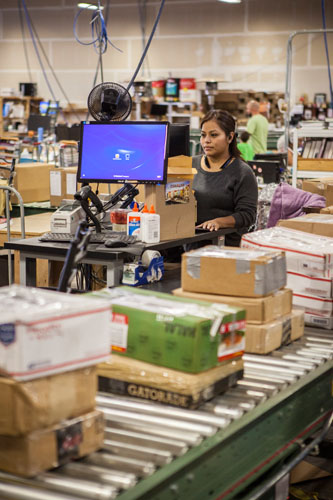BY AMY MILSHTEIN
Everyone knows college is expensive, but a look at the numbers brings that into sharp — and painful — focus.

BY AMY MILSHTEIN | PHOTOS BY JASON E. KAPLAN
Everyone knows college is expensive, but a look at the numbers brings that into sharp — and painful — focus. College students spend an average of $1,100 per year on textbooks, according to Scholarships.com. Pile that amount onto the College Board’s estimated yearly tuition of $8,893 for public colleges or the whopping $30,094 for private school, and it’s enough to make cash-strapped coeds and their parents groan. “Textbook prices seem artificially inflated,” says Bookbyte CEO Steve Gross, “and that’s a burden on students.” Bookbyte seeks to ease that burden by selling new and used textbooks at competitive prices.
Gross knows college textbooks. The 66-year-old Boston native has been selling them all his professional life. He landed in Oregon in 1999 because he likes the climate, and he picked Salem as his home base so he could service the wide swath of universities located nearby and “still be home in time for dinner.” From his perch, he’s seen the business morph and prices swell, and as a result predicts its eventual demise. “The paper textbook will be dead in 20 years.”
 While the rise of the e-reader and its subsequent effect on the paper book business has been well documented, college textbooks seem to be lagging behind the trend; hence the slow death. Gross attributes the pace to a variety of reasons: pushback from publishers, professors’ unwillingness to adopt a new pedagogy and the slow development of e-readers appropriate for college students.
While the rise of the e-reader and its subsequent effect on the paper book business has been well documented, college textbooks seem to be lagging behind the trend; hence the slow death. Gross attributes the pace to a variety of reasons: pushback from publishers, professors’ unwillingness to adopt a new pedagogy and the slow development of e-readers appropriate for college students.
However, two things have changed quickly in the business of acquiring textbooks: the ubiquity and acceptance of the online retailer and the rental model. “That’s the space Bookbyte operates in,” says Gross.
An admitted “serial entrepreneur,” Gross got his start by putting a book up on eBay in 1999 as an experiment. “It sold with a handsome margin.” Fast-forward and today Bookbyte operates out of a 70,000-square-foot warehouse in Salem. The company employs 125 people year-round with ranks swelling to 250 during peak periods. During those periods — the six weeks before fall and spring semesters start — Bookbyte moves between 5,000 and 15,000 books a day through its warehouse.
Gross acknowledges the drudgery of warehouse work with a variety of perks. Employees can refuel at the on-site cafe, which features whole-food, plant-based choices (“Don’t call it vegan,” insists Gross, who is devoted to the diet), much of it grown in an on-site garden. They can also work out in the sizable gym or join a support group to give up smoking or soda drinking. “We provide a unique culture here and lots of fun. In fact, I’m thinking of changing the name of the HR department to ‘The Fun Guys.’”
Business has responded favorably. Gross doesn’t reveal numbers, but he reports steady growth for the past five years. The year 2013 was the company’s most profitable and 2014 is on track to top that. While 5% of Bookbyte’s business is new textbooks, it’s the used books that drive his company’s success. “New is easy; sourcing used books is the challenge, and college bookstores aren’t equipped for it,” he says. Using software his company developed, he partners with hundreds of college bookstores around the country, including Oregon State and the University of Oregon, procuring used books on their behalf. “They give us a list of 500 titles, and we can spit back in real time what we can garner and at what prices.” He also sells to individual students.
Used textbooks are old news, but a new model, renting textbooks, promises more savings to the student and better margins for companies like Bookbyte. The company entered this market in 2012, tweaking the traditional rental model with a Guaranteed Buyback program that gives the student the option to keep the book for a fee or sell the book back at a guaranteed price. “Our profit is smaller per transaction than selling, but we usually get the book back, so the net outcome is better,” explains Gross. To date Guaranteed Buyback makes up 30% of Bookbyte’s business with the expectation of growth.
 Ironically, it is Gross’ biggest competitor, Chegg, whom he has to thank for this new development. The Santa Clara, Calif.-based public company bills itself as an online learning platform offering scholarships, course reviews, homework help and textbook rentals. With fiscal 2014 revenues between $305 million and $315 million, the company is a bear that cannot be ignored. “They went into rentals big five years ago and promoted it so well that it’s become very popular.”
Ironically, it is Gross’ biggest competitor, Chegg, whom he has to thank for this new development. The Santa Clara, Calif.-based public company bills itself as an online learning platform offering scholarships, course reviews, homework help and textbook rentals. With fiscal 2014 revenues between $305 million and $315 million, the company is a bear that cannot be ignored. “They went into rentals big five years ago and promoted it so well that it’s become very popular.”
Along with Chegg, Gross claims to have thousands of competitors — theoretically, anyone with a textbook for sale and Internet access can be in the business. But only a handful of those — “under 10” — in his estimate, are true competitors in size and scope. Part of playing at this level means knowing a given book’s worth, which, like any commodity, can change by the minute. This job is tasked to Bookbyte’s unique software and the seven-person business intelligence team that manipulates it.
But so what? Aren’t Bookbyte and all the other textbook sellers dinosaurs waiting for the meteorite known as rising shipping costs, e-readers and online learning to take them out?
Eventually. Colleges and universities are slow-moving beasts with ingrained pedagogy and a reputation for clinging to tradition. So for now the paper textbook is safe. In the meantime, Gross knows his business, warehousing and distribution models will work for other products. Today Bookbyte’s business intelligence department focuses on textbooks, but Gross imagines a time when he will sell a different product, perhaps one that reflects his passions for health and well-being.
Diversification is imminent. A spin-off company that simplifies online listing and processing, called SellerActive, already operates out of the space, and Gross is ready to take on any new challenges. He plops a coonskin hat on his head — imagine Davy Crockett — to remind himself of the pioneering spirit and camaraderie that made Bookbyte what it is and he imagines what the future will bring. “I’m not sure what we will do. But it will be fun.”
Bookbyte
CEO | Steve Gross
Headquarters | Salem
Employees | 125 year round; 250 during peak time

